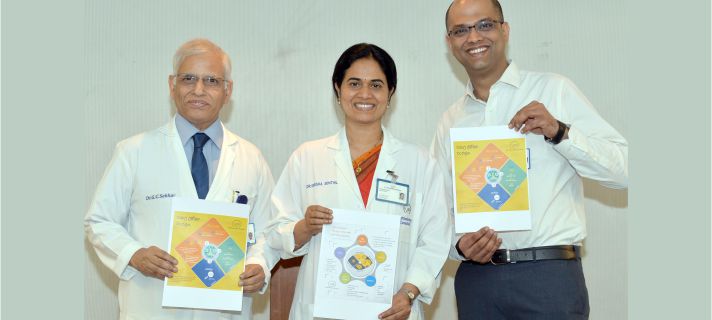POOR AWARENESS MAKES GLAUCOMA AN EXTREMELY DANGEROUS CONDITION WITH THE POTENTIAL TO CAUSE IRREVERSIBLE VISUAL IMPAIRMENT

L. V. Prasad Eye Institute (LVPEI) plans a series of activities to commemorate World Glaucoma Week, from March 10th to 16th, 2019, to bring public focus on the eye disease that affects both adults and children. A Glaucoma Awareness Walk is being organised on March 10th to raise awareness and knowledge about Glaucoma, which is seen as the leading cause of irreversible blindness in India. Also on the agenda there is a Glaucoma Education Forum on March 15th, to educate the public on the need for periodic eye check-ups and the harmful effects of prolonged steroid use.
"As the leading cause of irreversible blindness and a major cause of vision impairment, glaucoma care and delivery need to be a part of our strategies to deliver universal health coverage. Poor patient awareness makes glaucoma an extremely dangerous condition with high potential for causing irreversible visual impairment in millions of patients. Prevention and early treatment of glaucoma are key aspects in combating this disease," said Dr. Sirisha Senthil, Head of Glaucoma service, L. V. Prasad Eye Institute. She saidthe focus of this year's awareness is children, over use of medication, and families with a history of Glaucoma being at high risk. She added that all the family members should get screened for glaucoma annually to prevent them from getting glaucoma and going blind. Having glaucoma is not the issue, but not detecting and treating it in time is the problem. Even those with an injury, or with myopia or high minus power are at high risk of glaucoma, and they need to undergo a check-up routinely. We should be careful of any form of steroids, as even skin creams, asthma puffs or any other medication in the form of tablets which are unmonitored, can be sometimes harmful and lead to glaucoma.
Dr. G. Chandra Sekhar, Vice Chair, L. V. Prasad Eye Institute, said, “Most people aren't aware of glaucoma, and even when the professional wants to do a complete eye check-up, they are happy to check their eye sight but try and avoid a comprehensive eye check-up. However, if they become aware that there is a blinding disease of the eye known as Glaucoma, then they may become extra cautious and undergo a complete check-up, which facilitates early detection and treatment. Across the world, including in developed countries, 50% of those with glaucoma don't know they have glaucoma, and in India, 90% of those with glaucoma may not be aware that they have glaucoma. The second paradox is 50% of the people who have glaucoma, have seen an eye care professional in the last two years, but their disease hasn't been picked up, either because the examination was not complete or because they were in a hurry and didn't allow a complete examination to be done. 50% of the people who were told they have glaucoma and needed treatment, were not compliant with the treatment.
To prevent Glaucoma:
Regular eye exams are the best form of prevention against significant glaucoma damage. Early detection and careful, lifelong treatment can maintain vision in most people. In general, a check for glaucoma should be done:
• before age 40, every two to four years
• from age 40 to age 54, every one to three years
• from age 55 to 64, every one to two years
• after age 65, every six to 12 months
• Anyone with high risk factors should be tested every year after age 35

 Disclaimer: Welthi.com does not guarantee any specific results as a result of the procedures mentioned here, and the results may vary from person to person.
Disclaimer: Welthi.com does not guarantee any specific results as a result of the procedures mentioned here, and the results may vary from person to person.









